Garmin’s new top running watch, the Forerunner 970, has very big shoes to fill as it attempts to replace one of the best training and race companions available. Can a built-in torch, a software revamp and voice control really make a difference?
The new top-of-the-line Forerunner takes the body of the outgoing Forerunner 965 and squeezes in a much brighter display, useful new running analytics and more of the advanced tech from Garmin’s flagship adventure watch the Fenix 8.
These upgrades come at a steep cost of £630 (€750/$750/A$1,399) – £30 more than its predecessor – placing it right at the top of the running and triathlon watch pile, although less than the £780 Fenix 8.
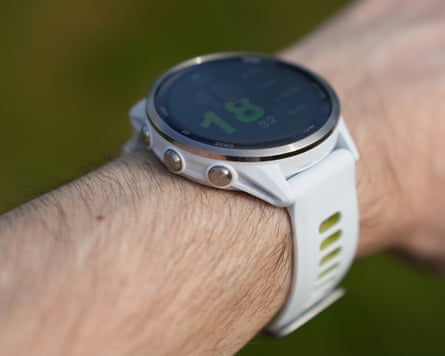
The 970 is about the same size as the outgoing 965 with a 47mm case and a beautiful, crisp and very bright 1.4in OLED screen. The touchscreen is covered in super-hard sapphire glass similar to luxury watches, while the titanium bezel finishes off the polycarbonate body in a choice of three colours.
Quite a lot of the upgrades are trickle-downs from the Fenix 8 and make the 970 a better everyday smartwatch. It has Garmin’s new offline voice control system, which allows you to quickly set timers and alarms, access settings or start activities. The watch also connects to your phone’s voice assistant and takes calls on your wrist via Bluetooth.
A revamped interface speeds up access to notifications from your smartphone by swiping down from the top of the screen. With an iPhone you can view and dismiss text-only notifications but connected to an Android phone you can also see images in notifications and directly reply to them from the watch. The 970 has Garmin Pay for contactless payments, although bank support is limited, and can control music on your phone or download playlists from Spotify, Amazon Music, YouTube Music and others for phone-free music on runs.
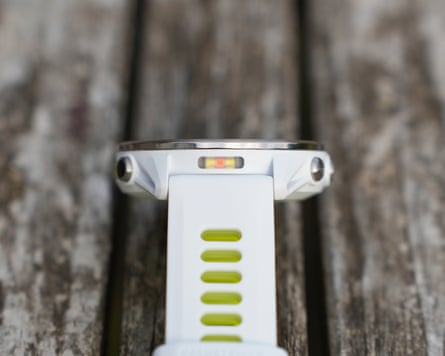
The best new feature is the LED torch built into the 970’s top edge. It was invaluable on the Fenix 8 and is my favourite new addition to the Forerunner. It is bright enough to light your way on the street at night or find things buried in dark cupboards but can be turned a dim red to avoid waking everyone at home. It can also be used as a strobe light for running to help keep you visible at night.
The battery lasts about six days with general smartwatch usage, including having the screen on all the time, all-day and night monitoring of health, plenty of notifications and copious use of the torch. The screen has automatic brightness but turning it down one notch in settings, which was still plenty bright enough to see outdoors, added a couple of days to the battery life. Turning the always-on display setting off extended it further to about 12 to 15 days.
Specifications
-
Screen: 1.4in AMOLED (454x454)
-
Case size: 47mm
-
Case thickness: 13.2mm
-
Band size: standard 22mm
-
Weight: 56g
-
Storage: 32GB
-
Water resistance: 50 metres (5ATM)
-
Sensors: GNSS (Multiband GPS, Glonass, Galileo), compass, thermometer, heart rate, pulse Ox
-
Connectivity: Bluetooth, ANT+, wifi
Running and activity tracking
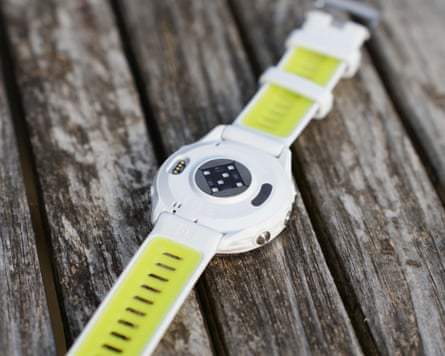
Its predecessor was a fantastic running watch filled to the brim with metrics, helpful analysis and buckets of customisation options, on which the 970 only builds. The screen is large enough to be able to clearly see up to eight data fields on screen at once. Maps look particularly good and are easy to use with touch.
It has the latest dual-band GPS, while Garmin’s algorithms consistently have higher tracking accuracy than its rivals, even with similar systems. The new Gen 5 Elevate heart rate sensor on the back improves pulse monitoring in tricky conditions, and provides ECG (arrhythmia) readings.
The 970 has Garmin’s suite of industry-leading fitness, recovery and training metrics, which are joined by a few new and interesting statistics, including two that attempt to help you prevent injury.
Impact load quantifies how hard a run is on your body based on its intensity and difficulty compared with an easy, flat run at slower speeds. One fast, hard 7km run was rated as equivalent to a gentler 12km run, which felt about right in my feet and legs and made me consider taking a longer recovery time before the next workout.
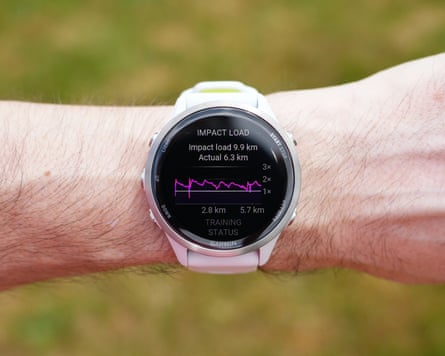
In addition, the new running tolerance feature tracks your mileage over a seven-day period and advises how much more you can run without increasing your chance of injury. Many runners, including myself, have injured themselves when ramping up their weekly distance too fast when training for a race, which this new stat is an attempt to avoid by giving you suggested guard rails.
The 970 also has a new running economy feature that tracks efficiency of your form, including how much speed you lose as your foot hits the ground, but it relies on Garmin’s latest heart rate monitor strap, the HRM 600 – a £150 separate purchase.
Running battery life is a solid 11-plus hours with its highest accuracy settings and listening to offline music via Bluetooth headphones, or about 16 hours without music. Turning down the screen brightness a bit added several hours to the running battery life, while reducing the GPS accuracy mode can last up to 26 hours.
Solid general health monitoring
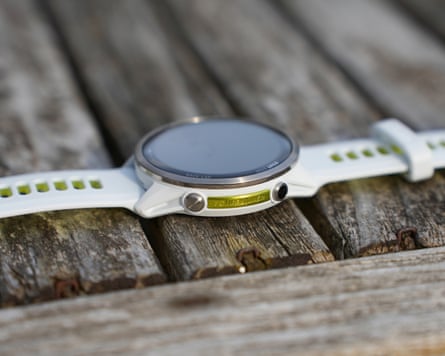
The Garmin isn’t entirely about running, triathlon and its 30-plus sport tracking features. It also has a comprehensive suite of general health monitoring tools, including good sleep, activity, stress, women’s health and heart health tracking rivalling an Apple Watch or similar.
Most of Garmin’s most advanced training tools also monitor your recovery from exercise during the rest of the day and night, advising you in the morning and during the day how your body is doing. It has a built-in sleep coach, a running or triathlon coach and various advisers for activity, suggesting when to do a hard workout and when to take it easy. The daily suggested workouts are dynamic and based on your sleep and recovery, so it will never prompt you to do a hardcore workout when you’ve had a terrible night. These automatic workouts can be replaced by a coaching plan, either using Garmin’s solid tools or third-party ones placed on a calendar before a race.
Sustainability
The watch is generally repairable with options available via support. The battery is rated to maintain at least 90% of its original capacity after two years of weekly charging. The watch does not contain any recycled materials. Garmin guarantees security updates until at least 21 May 2027 but typically supports its devices far longer. It offers recycling schemes on new purchases.
Price
The Garmin Forerunner 970 costs £629.99 (€749.99/$749.99/A$1,399).
For comparison, the Garmin Fenix 8 costs from £780, the Forerunner 570 costs £460, the Garmin Forerunner 965 costs £499.99, the Apple Watch Ultra 2 costs £799, the Coros Pace Pro costs £349, the Suunto Race S costs £299 and the Polar Vantage V3 costs £519.
Verdict
Garmin continues to set the bar for running watches with the Forerunner 970. It isn’t a dramatic leap over the outgoing Forerunner 965, instead adding a few bits to the already excellent formula.
The screen is brighter, covered in scratch-resistant sapphire and ringed by a titanium bezel, which gives it a premium look and feel alongside a more modern and responsive interface. The added bells and whistles of voice control and faster access to notifications make using it as a smartwatch alternative much easier. Though wearing it is still a statement about your sporty priorities compared with an Apple or Pixel Watch.
The upgraded heart rate sensor helps keep things locked during more difficult exercises and adds ECG readings for more comprehensive heart health tracking. But it is the built-in torch that is the best addition for daily life. Every watch should have one.
Meanwhile, the new impact load and running tolerance features could be very useful for avoiding strain and injury, adding to the already excellent training and recovery tracking. Plus it has market-leading running accuracy and detailed onboard maps for routes or if you get lost.
If you want a premium running and triathlon watch with all the bells and whistles, the Forerunner 970 is the best you can get. It just comes at a very high cost.
Pros: super bright OLED screen, built-in torch, phone and offline voice control, Garmin Pay, extensive tracking and recovery analysis for running and many other sports, full offline mapping, offline Spotify, buttons and touch, most accurate GPS, ECG.
Cons: expensive, limited Garmin Pay bank support, still limited smartwatch features compared with Apple/Google/Samsung watches, battery life shorter than LCD rivals.
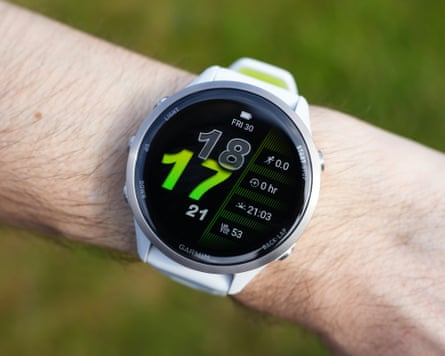

 2 months ago
86
2 months ago
86

















































